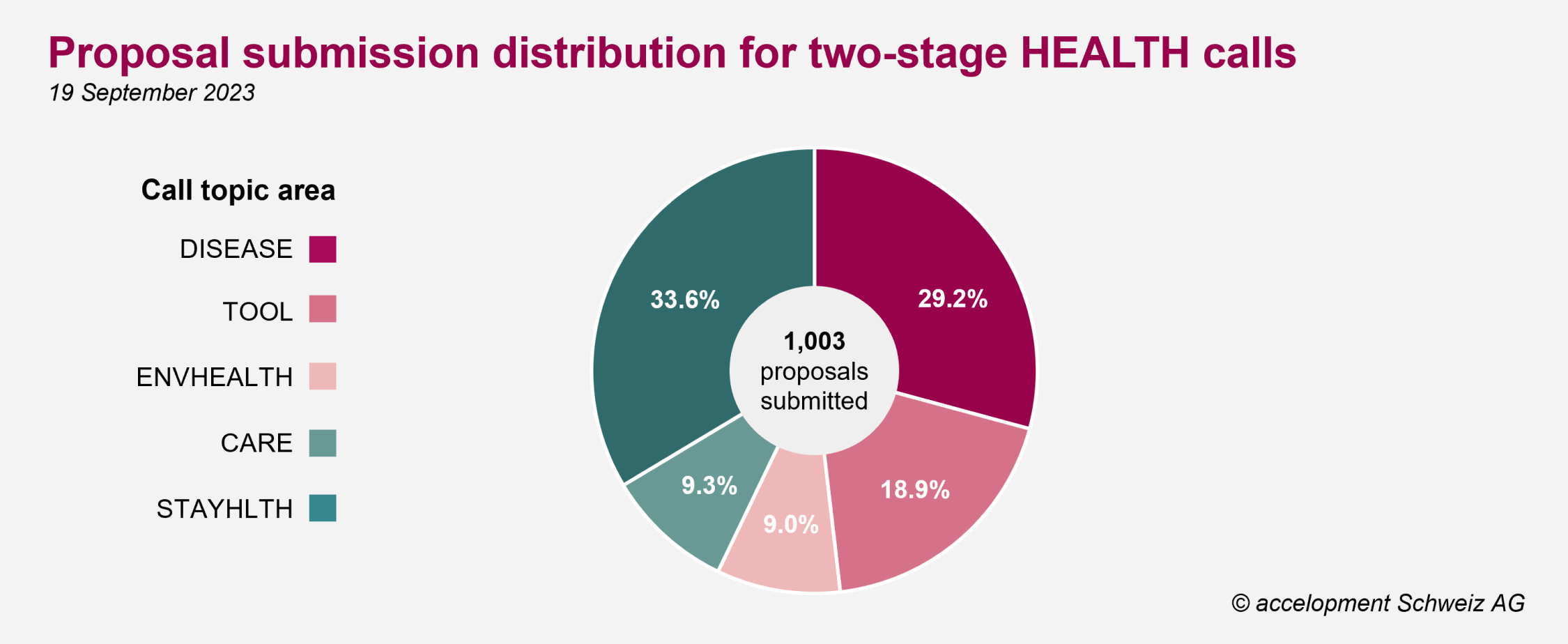Popular European health research grants – stats for the recent stage-1 submission deadline
12th October 2023 at 2:02 pm
The statistics of the recent Horizon Europe Health stage-1 proposal submission deadline on 19 September 2023 suggest that the Health programme (Cluster 1 in Pillar 2 of Horizon Europe) is more popular than ever. A short analysis reveals the following numbers:
| Topic | Title | Submissions stage 1 | Expected nb. of projects | Expected success rate (relative to stage 1) |
| HLTH-2024-DISEASE-03-08-two-stage | Comparative effectiveness research for healthcare interventions in areas of high public health need | 91 | 6-7 | 6.6-7.7% |
| HORIZON-HLTH-2024-DISEASE-03-11-two-stage | Pandemic preparedness and response: Adaptive platform trials for pandemic preparedness | 10 | 3 | 30% |
| HORIZON-HLTH-2024-DISEASE-03-13-two-stage | Validation of fluid-derived biomarkers for the prediction and prevention of brain disorders | 74 | 3 | 4.1% |
| HLTH-2024-DISEASE-03-14-two-stage | Tackling high-burden for patients, under-researched medical conditions | 118 | 4 | 3.4% |
| HLTH-2024-TOOL-05-06-two-stage | Innovative non-animal human-based tools and strategies for biomedical research | 190 | 4 | 2.1% |
| HLTH-2024-ENVHLTH-02-06-two-stage | The role of environmental pollution in non-communicable diseases: air, noise and light and hazardous waste pollution | 90 | 8 | 8.9% |
| HORIZON-HLTH-2024-CARE-04-04-two-stage | Access to health and care services for people in vulnerable situations | 93 | 5 | 5.4% |
| HORIZON-HLTH-2024-STAYHLTH-01-02-two-stage | Towards a holistic support to children and adolescents’ health and care provisions in an increasingly digital society | 129 | 3 | 2.33% |
| HORIZON-HLTH-2024-STAYHLTH-01-05-two-stage | Personalised prevention of non-communicable diseases – addressing areas of unmet needs using multiple data sources | 208 | 5 | 2.4% |
The figure below shows the first-stage proposal submission distribution among the 5 Health call areas:

Although the total number of submitted proposals was high in particular for two of the nine call topics, similar numbers can be seen in previous stage-1 submission deadlines. The success rates based on this first submission are a bit misleading as we do not know how many of these short proposals will be invited to stage 2 with a submission deadline on 11 April 2024. Based on our experience, the chances of success in stage 2 can be between 10% and 33%, depending on the number of pre-selected applications. We will know soon: evaluation results are expected to be communicated on 24 January 2024 according to the call pages or 18 December 2023 according to the EU Funding & Tenders’ Portal.
Starting from scratch for your stage-2 Health proposal?
It might be worth giving thought to the two new rules, namely the blinded approach in stage-1 and lump sum budgeting, now while your proposal is still in your mind and/or discussing with your partners the necessary changes. In stage-2, you will be able to name your project partners and their key expertise and assets again. Additionally, you may wish to split up work packages (WPs) into more and shorter WPs to better manage payments during the project implementation. In lump sum projects, European Commission makes interim and final payments based on the completion of individual WPs. There are guidance documents and best practices that we would like to share with you here.
Lump sum funding is enforced in Horizon Europe mainly to reduce administration and financial errors by removing the need to report actual costs and resources. Instead, lump sum funding relies on cost estimations, streamlining administrative procedures and thereby allowing project teams to focus more on their research and innovation efforts. The new approach was tested extensively in the Horizon 2020 lump sum pilot during the last three years of the programme. When it comes to your proposal preparation, lump sump proposals use the same standard Horizon Europe application forms and are subject to the same evaluation criteria as for other Horizon projects: excellence, impact and implementation. However, there are two points that are specific to lump sum proposals regarding the evaluation of implementation:
- As mentioned above, for each WP, one lump sum is defined and paid out based on the level of completion of each WP at the end of each reporting period. To ensure smoother implementation and more sound project financial management, the EC recommends WPs with long durations (e.g., Management and Dissemination WPs) to be split up according to the reporting periods. You may include as many WPs as needed, but they should still be effective and support the entire project (a single task or activity is not a WP). If it is not possible to complete a WP by the end of the project for technical/scientific reasons or due to force majeure, the lump sum is partially paid, according to the degree of completion. For more details, refer to section 5.3 Payments of the EC’s guidance document ‘How to manage your lump sum grants’.
- Applicants need to complete the detailed Excel budget table for cost estimations provided in the EU Funding & Tenders’ Portal, which must be submitted as an Annex to Part B of the application form. Here, you need to provide cost estimations for each cost category per beneficiary and affiliated entity (if any) and per WP. It is worth noting that the cost categories are the same and are still subject to the same eligibility conditions as in actual cost grants. Evaluators will mainly look at whether the estimations are reasonable and non-excessive, meaning that the proposed resources and the WP structure allow the efficient completion of the activities described in the proposal. Only clearly over- or underestimated costs will lead to a negative remark.
Making the best out of your Horizon health project!
We at accelopment have been fortunate in the Horizon’s health programme and have been able to work with committed coordinators and many project partners from all over Europe and beyond. Our successful Research and Innovation Actions include three recently approved Horizon Europe health projects that are currently in grant preparations with the EC and are set to start in January 2024. These are in addition to our four ongoing projects (COVend, GENEGUT, MyPath and ThermoBreast, and even more Horizon 2020 health projects, such as AI-Mind, ENVISION, EURO-SHOCK, EXIMIOUS and VANGUARD.
Moreover, we have successfully supported many health-related, EU-funded Innovative Training Networks. These include the Doctoral Networks BREAKthrough and MITGEST, the ongoing European Training Networks AGePOP, CAPSTONE, CONSENSE and NATURE-ETN, as well as the European Industrial Doctorates InPharma and MOSAICS.
We are always interested in supporting new project ideas and consortia, and we look forward to hearing from you.

Marco Cavallaro
Research & Innovation Project Manager

